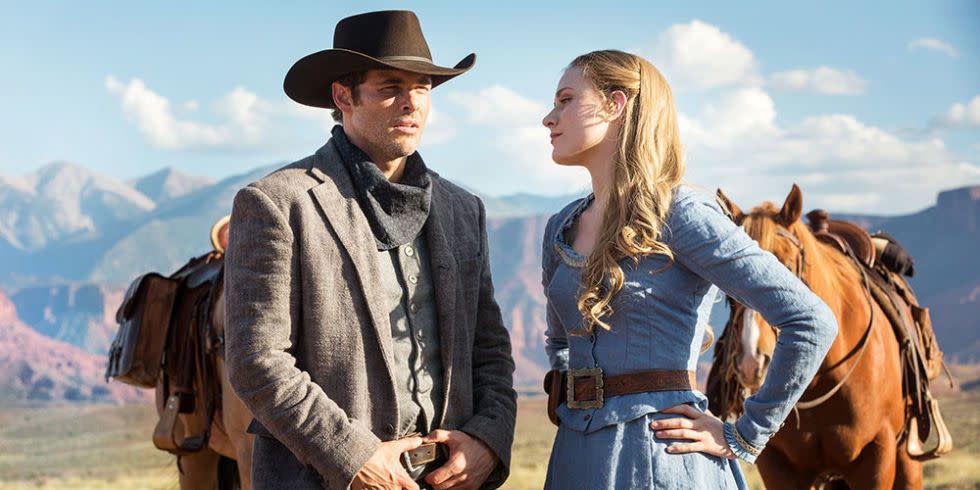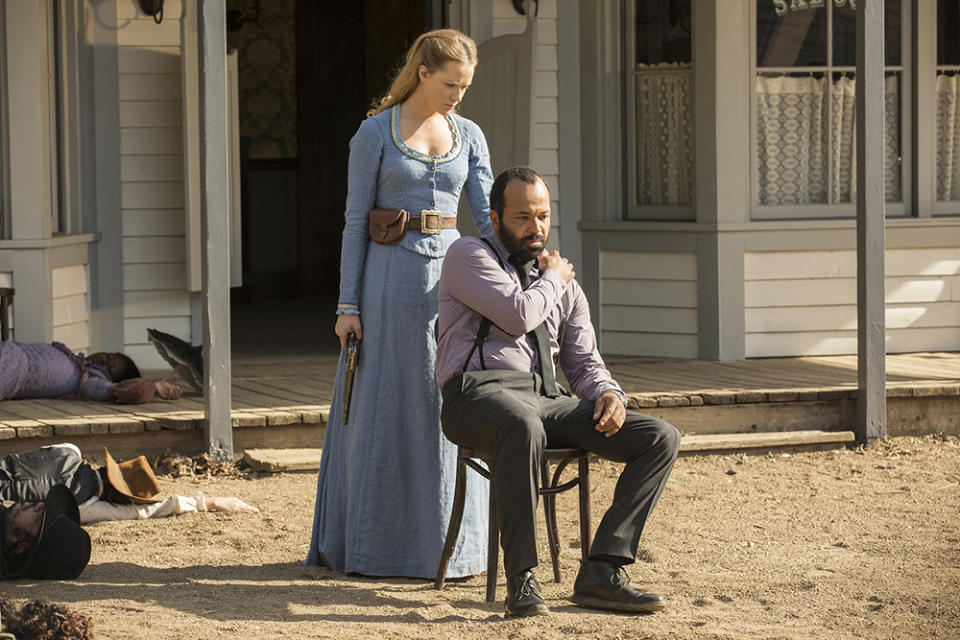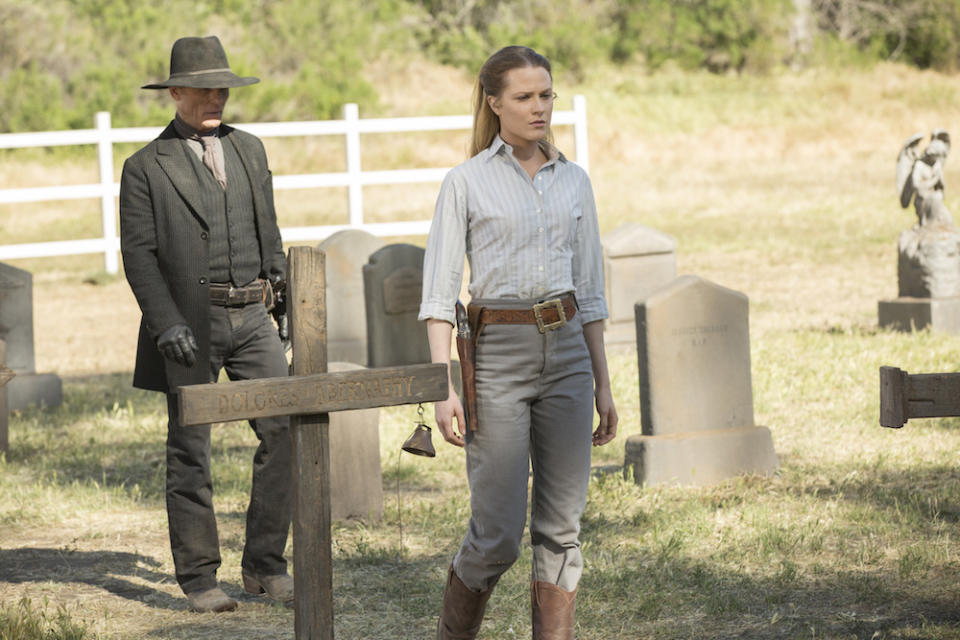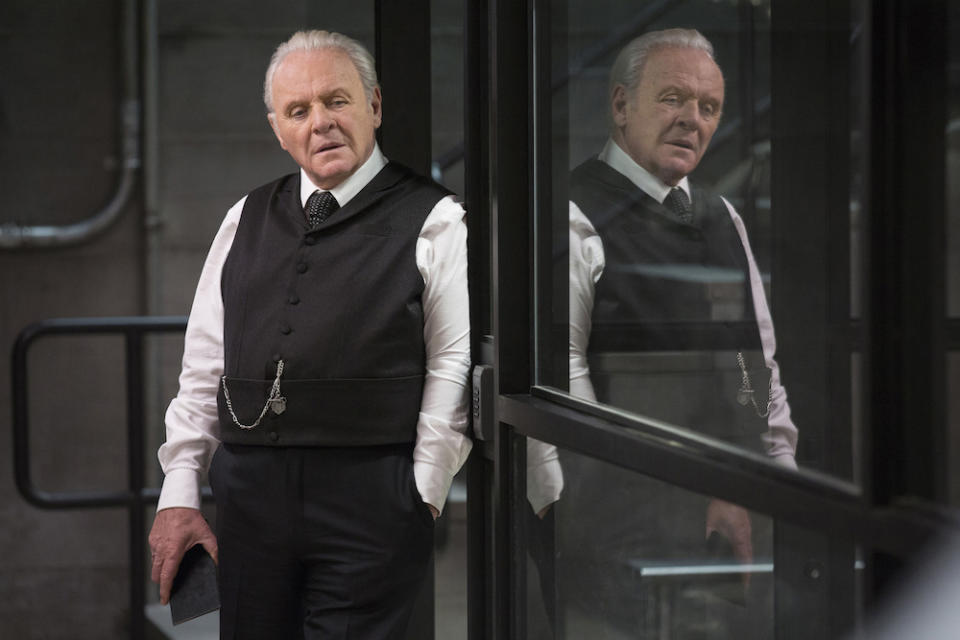The 'Westworld' Co-Creator Saved the Twist You Might Have Missed For Season Two

Like the Man in Black-that obsessive wanderer who will stop at nothing to learn everything about his favorite game-Westworld fans sat down to watch the Season One finale and knew exactly what would happen on Sunday night. A testament to the intricate writing on behalf of Jonathan Nolan and Lisa Joy, the HBO science fiction series has invited equally passionate viewers. Since the show debuted on October 2, Reddit threads and fan sites have dug through every frame of all 10 episodes to find each clue woven into the show's multi-layered narrative.
Fans knew William was the Man in Black. They knew Bernard was a host. They also knew Bernard was Arnold. And they knew there were multiple timelines. Casual viewers might not have caught this, but the ones who got lost in this maze had figured it out. Not everything, though-Nolan and Joy had kept a few more nuanced twists and thematic reveals until the very end, gracefully giving viewers at once what they expected, what should happen, and something new.
[contentlinks align="center" textonly="false" numbered="false" headline="Related%20Stories" customtitles="How%20Jeffrey%20Wright%20Held%20'Westworld'%20Together%7C7%20Things%20We%20Want%20From%20'Westworld'%20Season%20Two%7CDid%20Westworld's%20Violent%20Delights%20Justify%20Its%20End?" customimages="||" content="article.51264|article.51247|article.51244"]
Which puts us at the end of Season One: Robert Ford is dead. Dolores has achieved sentience. Maeve and the other hosts have begun their revolution. Bernard knows who and what he is, and is now the only one seemingly with knowledge of how these machines work. And with many more questions ahead of us, Nolan (who also directed the finale) talked to Esquire.com to discuss how fans figured out the twists, what will happen in Season Two, and why it won't air until 2018.
ESQ: Congrats on such a successful first season. How does it feel to have it out there finally?
Jonathan Nolan: It's great. It has been a labor of love, this thing. Lisa and I started talking about it three years ago, so to have the whole first season out there is fantastic.

It turns out that a lot of the theories out there were right. Were you surprised that the internet figured them out?
I remember the early feedback on Memento. [My brother, Christopher Nolan] had shot it and we had it finished, and we were struggling to find someone to release the film. We had all the international markets lined up, it came out in England, and we were still looking for someone to release it here in the States. And a lot of the feedback we got from the people that would watch it and say, "Well, you know, I love it but I don't think the audience would love it." And we'd want to say, "Well, what the fuck makes you think you're smarter than the audience?" My whole career from that point on was-when we finally did get that film out and it connected with audiences and people that had scrutinized it-validated for us that you never want to underestimate the audience. The audience is always smarter.
It's been hugely gratifying to see. I mean, all of the pieces that we had carefully woven into it. Knowing, on the one hand, for that portion of the audience that wants to get in there and aggressively scrutinize it and talk about it. But you're also writing for the mainstream audience, which maybe isn't spending a lot of time online but is just kind of experiencing it. And you want to make sure that if you're revealing something to them, that it has the ring of truth by the time they understand it. And the only way to do that is to carefully weave it in from the beginning. So it was very gratifying to see people obsessing over it, enjoying it, and getting it.
You never want to underestimate the audience. The audience is always smarter.
And I think what's interesting is that some of the theories were right and then some of them didn't even figure out a lot of what was in that final episode. I mean, there were more nuanced twists, like Maeve being not as conscious as she was and the maze leading to a buried children's game. Do you think those were the real twists in the final episode, these ones that not a lot of people caught?
Yeah. I mean, you're looking at people online saying, "Oh, we figured it out already." It's exciting on one hand. I used to be that guy who would try to figure out movies as I was trying to watch them, and ruined a couple of movies for close friends of mine, who were so upset about it. I think we always knew, lots of layers, twists upon twists. The whole idea with the series was to take it from the perspective of the AI, of the hosts themselves, who have a very limited understanding of their world. And trying to dole out-not because we were going to do a puzzle for the sake of a puzzle. The reason you don't see the outside world-and I'm sure people would love to know what that outside world looks like...they should stay tuned-was because the hosts haven't seen it yet. We really wanted to hold ourselves to that narrative conceit.
That meant that there would be an awful lot that they didn't understand and an awful lot about their world that was news to them. As we got closer to the finale, we know that even if people had figured out some things, there would almost be certainly things that they hadn't figured out. And we also had the not-so-secret weapon of our entire cast, but, specifically, Anthony Hopkins. If you're going to write a morally ambiguous character-you don't know if he's a good guy or is he a bad guy because we can tell that he's played both-you simply could not find a better actor to portray that role than Anthony Hopkins. [Ford is] sort of an angry God, and you don't know if he's going to punish his creations or set them loose. And I was very gratified to see that people were genuinely surprised by that turn of events.

I interpreted it as him finally letting them free but for reasons that were morally ambiguous, as you said. Is that correct? And is that kind of what you wanted viewers to take away?
Yeah, absolutely. But I think, through the course of the season, you first meet him and you think of him as sort of this reserved, thoughtful, god-head figure. And throughout the course of the season, you begin to understand that there's an awful lot more going on there. I think going into this episode, everyone imagined that he was sort of the villain. And certainly what he does is very morally questionable. But in terms of his relationship to the hosts, who we've taken as a protagonist to the story, yeah, he is definitely been on their side.
I always think of the theories that people are coming up with and the obsession that we saw throughout this season as the show's own obsessive gamer version of the Man in Black. I mean, would that be an accurate statement? And would that make you and Lisa the Ford and Arnold?
[Laughs] God, I hope not. No, I think the show, on a meta level, is about our entertainment from stories that we like to watch-the amount of firearms in those stories, the amount of trauma that happens in what we like to watch versus our real lives. It's also a story about stories. Storytelling, look, it's what I do. I wasn't terribly interested, and I know Lisa wasn't either, in doing a show about showrunners. Our loop is the most boring loop you could conceive. Work, eat, play with our daughter, sleep, work, eat, you again, indefinitely.
I am interested in the act of storytelling and what it means about human consciousness. And this is one of those kind of philosophical bullshit sessions from the writer's room that turns out to actually be grounded in some really interesting observations-real observations, not just ideas we were tossing around. The more we wrote and thought about this idea, the more we began to read about the ways in which storytelling is a feature of human self-identity and consciousness. It's undeniable. The fact that we're storytellers uniquely, as far as we know, amongst forms of life, we role-play, we tell stories. And what the purpose of that is, for me, is something we're endlessly fascinated by. And this was a chance to play with that idea.

I kept thinking toward the end of the season about a quote from Evan Rachel Wood that this first season is kind of a prequel to the actual show. Does that kind of put us in a place going into Season Two where the set up is done and we're going into this revolution without Ford?
Yeah, I think a prequel or a prologue is definitely one way to look at it. I would describe it as sort of the first act of our story. So much of the time in TV the goal is to just cast some brilliant actors and build some good looking sets and just rinse and repeat, right? And that's been the model for 60 years. And it's produced some incredible, incredible television. And then you have these kind of outlier shows, like The Twilight Zone, where you have restless minds like Rod Serling where he just wanted to invent a new universe every week. The buy-in for us was that every season we would be able to be more ambitious and that we would be able to shift the story forward and reinvent it, to continue the story of these hosts that you've come to know but shift the terms and stakes and sometimes even the genre of what you're watching to allow us to reinvent the show, as much for us as for anyone else. But also to capture a really big ambitious story: the story of the emergence of a new form of life, and the bloodiness and the trauma of that.

Going into this final episode, how difficult was it to visualize the evolution of Dolores' bicameral mind, and how much research did you put into that theory?
We read a lot. The Bicameral Mind itself, Julian Jaynes' book, was one that we enjoyed and referenced specifically. There was an awful lot of other stuff that we read, from Marvin Minsky's work to Gödel, Escher, Bach, and a lot of thinkers who have played with and dwelled in this space, asking, "What is consciousness?" And it's still more in the realm of philosophy than it is of sort of a harder science like computer science. The computer scientists kind of want to stay away from the questions because it's a minefield. We did a lot of research and a lot of thinking because we felt like if we wanted to say something original about consciousness or depict the emergence of it, we needed to have a working theory of how that might come about. Not necessarily for humans, but how it comes about for these hosts.
Obviously, that would play with some of the same questions that humans ask themselves: What is the "I"? What is our sentience? Is it just another loop, a recursive loop within ourselves? Is it the ability to form a model of ourselves and query it? And that's the emergence of the inner monologue as a key feature of consciousness, along with memory, along with a narrative sense and a sense of one's self as the protagonist. So all these sorts of things we wanted to play with. We read an awful lot of stuff, and then had that sort of delicious moment in which something you've been playing with in the writer's room then maps onto something that someone much smarter and much more versed in the topic has been thinking about as well. We had a lot of those moments, which was fun.
We're just asking specific questions, and we're clearly trying to have our cake and eat it, too. We wrote a violent show that's a little bit about violence.
The violence on Westworld has been written about a lot this season. Do you think, in the end, all of it worked and justified it as a commentary on what we see in entertainment and as an analysis of the entertainment industry?
A little bit. I mean, Lisa and I aren't trying to supply answers. We're just asking specific questions, and we're clearly trying to have our cake and eat it, too. We wrote a violent show that's a little bit about violence. With the finale, the idea was to make the violence feel as simultaneously as cathartic and fun as it was to serving purpose. Because, in that moment, you've seen the violence perpetrated against hosts for many episodes. And however you felt about that, it's distinct from how you feel about the hosts now perpetrating violence against their human controllers in the park. We wanted the audience to feel just as uncomfortable as we did sitting there. I'm not a violent person and, I think as would most people, abhor violence in the real world. But it's deliciously fun not only to watch it not only in our film and TV and video games, but also to create it. It's a weird thing. Humans are fucking weird people.
With all the theories and conversations going on out there about the show, was there anything that the fans missed or anything that you thought they would pick up on that they didn't?
Wow, that's practically the invitation for even further deception on the part of our very smart, very vigilant fans. They got an awful lot. We layered an awful lot into there. And that was one of those gratifying experiences in my career that people care so much about the story we're telling to spend that much time dissecting what's there. I'm sure there are one or two things hidden away there that people haven't quite gotten to yet.

So there still could be more that we find out, I guess.
Well, we've left some questions on the table for the second season in terms of what Delos' actual agenda with the park. We know from Tessa Thompson's character, Charlotte Hale, that the theme park aspect of it is not the central moneymaker for them. Which, for us, mapped onto the slightly cynical moment we have in this age in which most of the services we avail ourselves online are free because the companies that are providing them are monetizing what we're doing in other ways that are less transparent. Hopefully many interesting questions left for the audience going forward, but hopefully a lot of satisfying ones answered.
Where are you at with Season Two? I know it was looking like a 2018 premiere, but have you started conversations there? Have you started writing?
Oh yeah, we've had the writers in for 10 weeks. We've been going full-no vacations for us, sadly, but a good problem to have. We got down a general structure for what we wanted the first three seasons to look like way back when, and we've been in with the writers for about 10 weeks. The reason the show won't be on until 2018 is because we discovered that shooting the pilot and then shooting the series that it's not like a regular TV show, and we don't have the source material to draw from-we're creating it on the fly, so we need more time. In the movie business, we're lucky if we could turn around a Batman sequel in three or four years. So I think the idea that we'll get this done by 2018 is actually remarkably quick.
You Might Also Like

